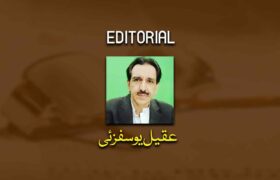Pakistan is facing its history’s toughest economic challenges with a new record inflation every day; soaring electricity bills to new heights and uncontrollable hoardings of essential items, further accentuating inflation. On the other hand, Pakistan’s external debt has skyrocketed beyond 100 billion USD, while the daily business is being run through printing of new currency notes. Pakistan badly needs around 70 billion USD in next two years to meet its growing trade deficit and repayment of external debt and interests payments on previous loans. Consequently, Pakistani rupee has become the worst performing currency in the region. Pakistan’s current economic woes are not a result of some overnight failures, but is an outcome of decades of poor fiscal management, ill planned development policies, inconsistent foreign policies and protectionist business models at the hands of incompetent and opportunist fiscal managers at the helm of affairs.
Pakistan needs to chart out a new course of fiscal recovery, but that course must be holistic, pragmatic, sincere and transparent and must address Pakistan’s economic challenges in a phased program, notwithstanding the hardships.
Before talking about the cotours of any recovery plan, let’s take a peek into Pakistan’s economic conundrum.
Biggest challenge for Pakistan is structural hiccups and impediments in its economic model. Pakistan continues to experience severe perpetual economic crisis owing to these long-standing structural weaknesses. The long-term growth of real GDP per capita has been persistently low, averaging only around 2.2 percent annually over 2000-22.
The long-term low economic profile /stagflation has come at an exorbitant cost; major part being massive external debt. Pakistan is currently facing the risk of default due to its massive external debt obligations. Unfortunately, the country’s external debt servicing is expected to rise to nearly $25 billion annually by the next fiscal year.
Growing loans have forced successive governments to introduce policies, which lead to rapid inflation. Pakistan’s skyrocketing inflation has negatively impacted the purchasing power of local consumers and businesses alike. Food inflation has almost reached 45 percent if not surpassed; not bearable for the common man. The pinch has been felt by even the lower, lower middle and middle classes of the society.
Continuously depleting foreign reserves is yet another growing economic challenge. It has directly contributed to the current account deficit and the trade imbalances. Pakistan’s economy is currently under severe stress with lowest foreign reserves and constantly depleting, a depreciating currency and highest ever inflation.
To make matters worse, Pakistan has inadvertently indulged into political instability and infighting. Not only Pakistan, economic growth of any country is contingent upon its political instability. It has drastically affected the formulation as well as implementation of economic reforms. This political conflict between the government alliance and opposition has further exacerbated the country’s economic crisis to new depths.
Right now, Pakistan needs to attract FDI to support its economic growth and development. This can be achieved by improving the business environment, reducing corruption and providing incentives for foreign investors. Pakistan Army leadership has emerged to steer the country’s troubled economy out of crisis. For this, FDI is a must. It has been realized by both political and military leadership that FDI can play a crucial role in the economic recovery of Pakistan but in that consistency of policies remained a missing link and still remains so.
Special Investment Facilitation Council (SIFC) has been established to remove this global concern. Now alongside civilian management, Pakistan Army leadership is an active part of it and will ensure consistency of policies. SIFC has been established to facilitate and fast-track FDI in the country.
GOVERNMENT’S ONGOING ANTI-SMUGGLING & ANTI-HOARDING CAMPAIGN PROVES SUCCESSFUL
Smuggling of goods, foreign currency, and petroleum products, as well as hoarding and the presence of a grey economy, are among the myriad factors contributing to Pakistan’s economic deterioration. Smuggling to and from neighboring countries causes irreparable damage to the economy. Realizing gravity of the matters, the provincial and federal governments with the active support of LEAs, have launched a full-scale operation against the culprits involved in smuggling, hoarding and illegal currency exchange (Hawala Hundi) activities.
According to the interim Interior Minister, Sarfaraz Ahmed Bugti, the government’s successful efforts in anti-smuggling and anti-hoarding campaigns have resulted in the recovery of thousands of metric tons of essential commodities, including wheat, sugar, urea, and petroleum products. Providing further details of the operation, he reported that within the past month alone, approximately 22,200 metric tons of wheat, 8,800 metric tons of sugar, 4,300 metric tons of urea, and petroleum products valued at 10,195 metric tons have been retrieved.
In the context of the anti-narcotics campaign, Minister Bugti disclosed that law enforcement agencies have confiscated 43 metric tons of drugs, leading to the registration of 200 cases against individuals involved in drug-related activities. Discussing the achievements in combatting the smuggling of dollars and illegal currency exchange, he mentioned that 168 First Information Reports (FIRs) have been filed against those engaged in such unlawful practices. The country’s dwindling inflow has been significantly increased as a result of Federal Investigation Agency (FIA) led and Pak Army backed economic drive.
TO ADDRESS THESE CHALLENGES, PAKISTAN NEEDS TO IMPLEMENT SOME SHORT AND SOME LONG-TERM STRUCTURAL REFORMS TO IMPROVE ITS ECONOMIC PERFORMANCE.
Pakistan needs to ensure greater fiscal discipline to overcome its current challenges. This could include reducing government spending and increasing revenue collection.

Pakistan needs to implement market-oriented reforms to improve its economic performance / output. This could include reducing trade barriers, improving the business environment and attracting FDI. In the meanwhile, short-term livelihood support can be provided to vulnerable households /strata of the society to help them cope with economic and climate shocks.
Pakistan needs to restructure its debt to reduce the burden of debt servicing. This could include negotiating with creditors to extend the repayment period or reduce the interest rates.
Pakistan also needs to stabilize / reduce the exaggerated exchange rate to reduce inflation and improve the balance of trade; appropriate measures are needed.
Pakistan needs to invest in infrastructure to improve its competitiveness and attract FDI. This could include improving transportation, energy and telecommunication infrastructure.
By implementing these short term measures, Pakistan can address some of its economic challenges and create a foundation for long-term economic growth and development. However, these measures need to be complemented by basic structural reforms to address the underlying structural weaknesses in the economic system as a whole.
In the long term, the reforms could include reducing the proportion of raw export goods and increasing the proportion of high value added exports, investing in human capital, improving infrastructure and attracting FDI.
Pakistan needs to achieve macroeconomic stability by reducing the current account deficit, building up reserves and stabilizing the exchange rate.
Pakistan needs to invest in human capital by improving education and healthcare. This can help to increase productivity and competitiveness in the long run.
Pakistan needs to diversify its exports and reduce its reliance on a few sectors, such as textiles. This can help to reduce the country’s vulnerability to external shocks and improve its competitiveness in the global market.
Pakistan needs to achieve political stability to create an enabling environment for economic growth and development. This can be achieved by strengthening political institutions and improving governance.




